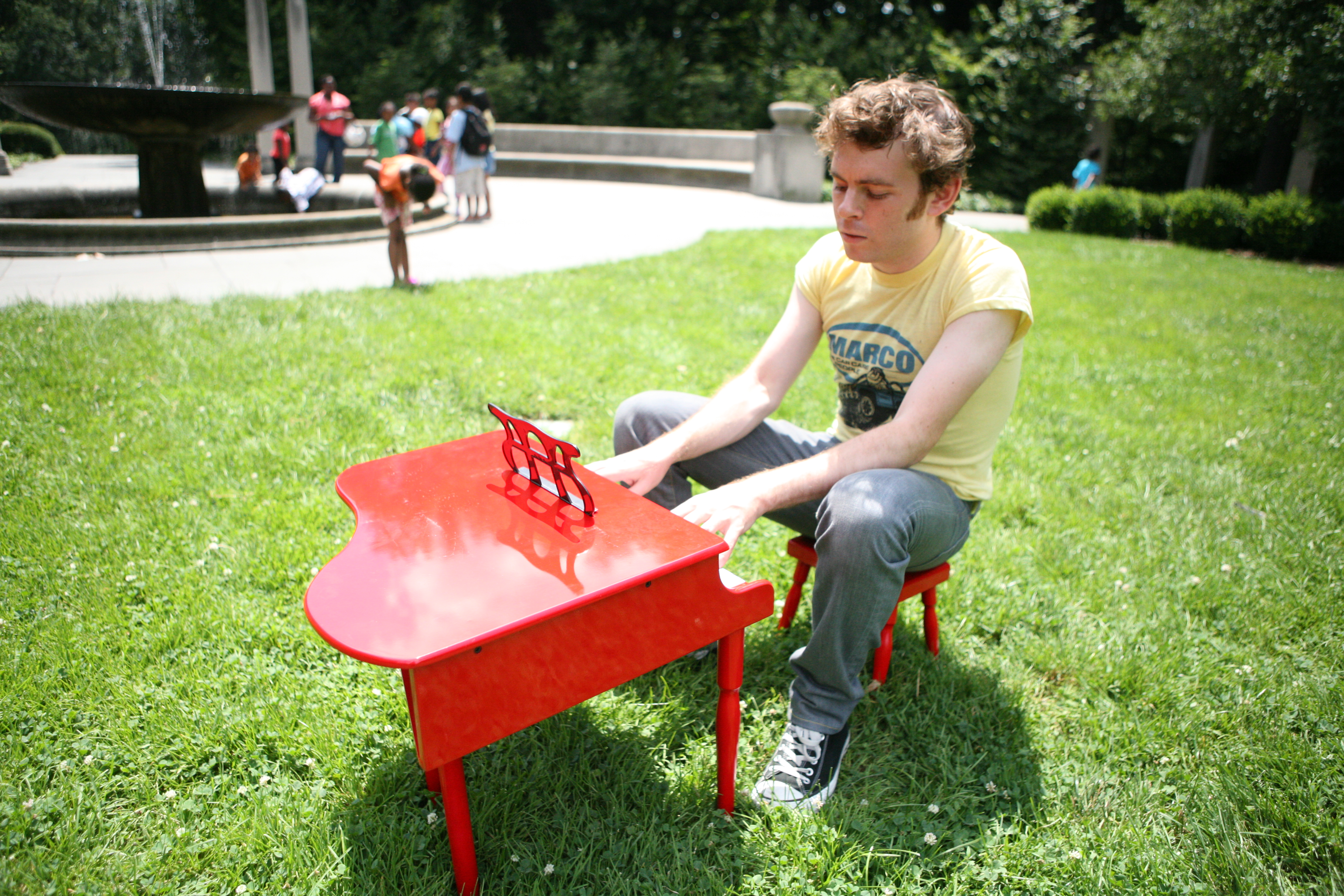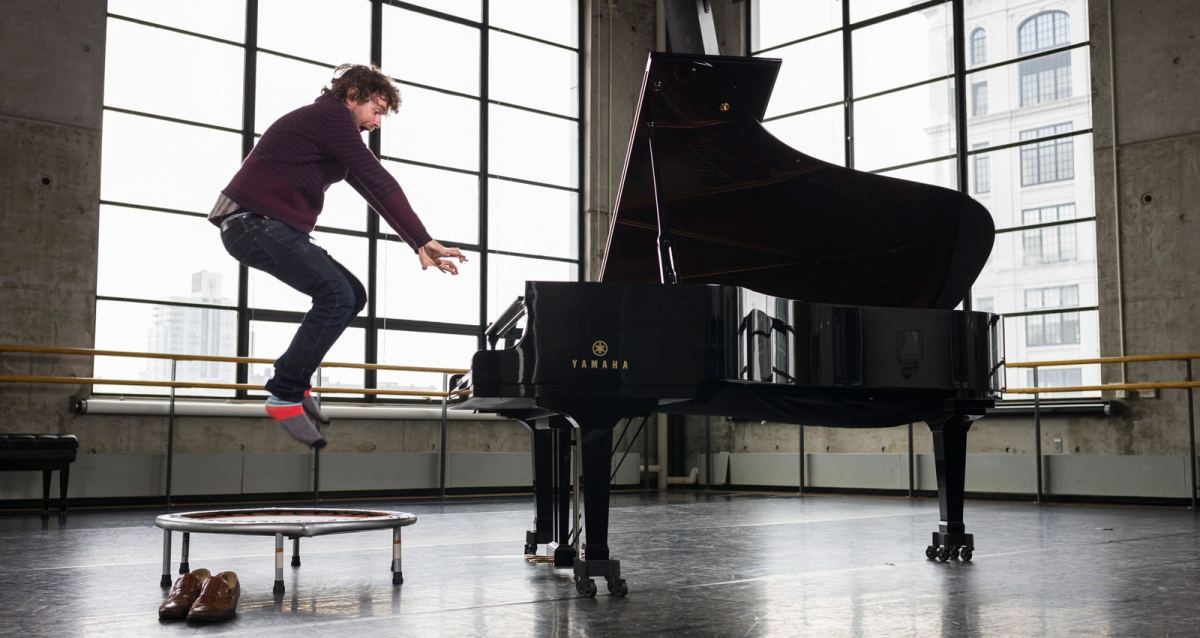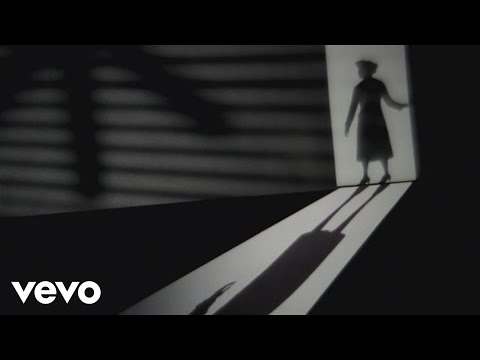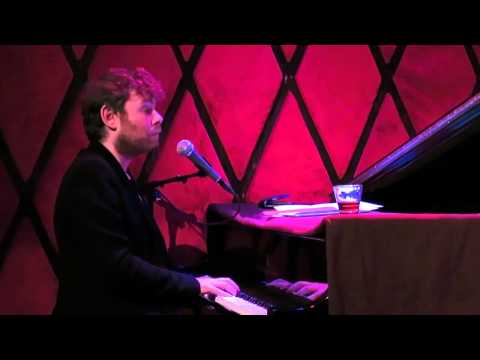Touring with Chris Thile. Singing Schubert with A Far Cry. Writing for the Kronos Quartet, Brooklyn Rider, Orpheus Chamber Orchestra, and many others. For a while, it seemed I couldn’t turn around in the contemporary music sphere of the Internet without tripping over the name Gabriel Kahane. After seeing him perform in Boston with AFC, I followed him on Twitter, and I found myself frequently clicking the heart button on his contributions. They were random. (“Pro tip: in iMessage, certain polyrhythms become cat emoji if you use a colon to describe the ratio. Just saying.”) They were funny. (“I’m such a lapsed Jew that when I saw a friend’s Instagram caption about ‘giving up grains’ I became incensed that she’d gone gluten free.”) They held nothing back. (“GOP senators, there’s no way to say this politely: you are geriatric shit seeping out of an adult diaper.”) He touched issues that many artists wouldn’t dare to poke, such as Hillary Clinton’s support of Israeli prime minister Benjamin Netanyahu, but he never seemed self-righteous. Having observed such public candor to be rarer in the world of concert music than in pop music, I contacted Gabriel to talk about speaking his mind as a genre hybrid. However, just as in his music, nothing was as straightforward and easily definable as it seemed. When I spoke to him via phone, he was at his home in Brooklyn, his cat Roscoe was curled up asleep on the floor, and he was enjoying a Twitter-lite life without the mobile app.
VAN: When did you start using Twitter and what did you mostly use it for at first?
Gabriel Kahane: The funny thing would be that now, I’m not using Twitter very much. Like many people I reached a moment where I was abusing it. I joined in September 2009, and I finally took the app off of my phone. I haven’t had it on for several months now and my life is much better. Not that that affects my political conscience: I don’t know, I guess there was a moment where Twitter seemed to be a hospitable space.
I think with respect to being politically outspoken in that space, it’s not a particularly effective method of communicating with anyone but those who already agree with you. There’s not enough real estate in 140 characters to make an argument that would change anyone’s mind. I have actually used my Facebook fan page to write little essay-lets, and I know that I do have a more politically diverse audience. I have a very small audience, but I know within that it’s not all flaming liberals like myself. I spent a good part of 2015 and some of this year touring with the Punch Brothers, Chris Thile’s band, and Chris had a fairly conservative audience from his time in Nickel Creek.
This is anecdotal, but during the primary season I was encountering a lot of younger people who fit the bill of the Bernie Bro to a certain extent. They were largely white men in their 20s who, I think, don’t necessarily understand the consequence of voting in a presidential election versus voting downballot.
And I’m guessing you’re a white man in your 30s?
[Laughs] Yes, guilty as charged.
The latest from VAN, delivered straight to your inbox
Did you grow up in a politically outspoken family?
Yes. My dad, who’s a concert pianist and conductor, got into huge trouble with the Board of the Colorado Symphony, where he was music director, for making political speech from the stage during the runup to the war in Iraq. He definitely has a strong political conscience and has since he was a teenager. But I don’t think anyone is obligated to have public political conscience, and there are instances in which people choose to sidestep talking about politics for fear of alienating people. But rather than avoid it altogether, I would rather make a nuanced and dialectical argument that appeals to reason.
Outside the paradigm of this insane circus, I would prefer to make nuanced political speech that attempts to use empathy for the other as the way of appealing to people with whom I might disagree, rather than forgo political speech altogether to not offend anyone. Also, my audience is so small that—who am I going to lose?
This is a two part question. I remember this one tweet you sent—it wasn’t political, it said “Please, please please stop talking about genre.” In advertising, you may be the person about whom I most often hear that you straddle the border between “pop music” and “classical music.” So, when other people aren’t writing about you, how do you describe yourself, labels be damned?
The reason that I bristle so much against discussions of genre: I wrote some blog post after three interviews in a row where people wanted to talk about genre, and then Ted Hearne wrote a really thoughtful response about why discussions of genre can be valuable. I feel like we live in a time when there’s so little nuanced thinking, and people are much more comfortable just describing the container in which something fits rather than talking about its qualities and its craft. The use of the vernacular in concert music and vice versa is not new. It goes back for centuries. Go back to the “Quodlibet” from the Goldberg Variations: it’s just two popular songs that Bach was able to fit into the chord progression. You can find instances of many composers drawing from the folk music of their time.
The generationally different thing is that my generation is the first to be writing the hybrid pieces where we were the originators of the vernacular material that we bring into the concert realm: the first to write that music and be protected by the Establishment. There are some past examples like Gunther Schuller, who brought jazz into the concert hall, but people like me, and Caroline Shaw, and Ted Hearne, and Bryce Dessner, and Nico [Muhly]—we’ve been given a platform that wasn’t previously available. The more interesting question to ask is: Does the embrace of hybrid music by these institutions have to do with the decline of the audience for concert music? Or is it an embrace that comes from them thinking that hopefully this is where the deepest music is coming from?
Gabriel Kahane, “Bradbury (304 Broadway)”
I didn’t answer your question. I think I’m a songwriter and storyteller. I’m interested in character, I’m interested in psychology, I’m interested in storytelling, and I write whatever music is necessary to tell those stories.
I have some questions about “Crane Palimpsest,” your new song cycle about the Brooklyn Bridge that you recorded with The Knights. Were you a lifelong New Yorker?
No, I was born in LA and then we moved to Boston, and Rochester, and back to California. I’ve only lived in New York for 13 years.
What drew you to the Hart Crane poem that you used?
I was at the MacDowell colony during a crazy time at my life. I was finishing up this musical called “February House” that was about to premiere at the Public, and I was doing rewrites on that. I was like, “If I’m now washed up, I’ll point to that moment as my moment.” I had a lot of opportunities and wasn’t saying no to any of them, and I was drowning a little bit in too much going on. So I had this time at MacDowell to retreat and write, and I was really struggling to find texts. There was an incredible library there, and everything in the library is donated by former colonists. It’s filled with work by colonists, so often the library represents work created there. I happened to find David Macaulay’s book about the Brooklyn Bridge, The Great Bridge, and I think actually reading about Hart Crane, his obsession with the bridge, and the fact that he ended up by weird kismet living in this apartment that had previously been occupied by Washington Roebling, the son of the original engineer, made it a very emotional book for me.
I was interested in writing a sort of New Yorky piece. There’s a way in which the poem is a little bit inscrutable. I find it to be on the denser side. It’s written in the kind of diction that is not immediately accessible to the contemporary ear. I was interested in juxtaposing that kind of modernism with musical modernism and my relationship to folk music, and trying to deal both with the literal bridge and the metaphorical bridge, having grown up in two musical traditions. I guess the piece was an attempt to allow those musical languages to coexist.
As you said earlier, you’re a white guy in your 30s. The most famous track on your album “The Ambassador,” “Empire Liquor Mart (9172 S. Figueroa St.)” is from the perspective of a 15-year-old black woman. So what was going through your head when you decided to tell that story, as you were writing it?
Gabriel Kahane performing “Empire Liquor Mart (9172 S. Figueroa St.)” at Rockwood Music Hall in New York in 2015.
As an artist, if you make text-based work where there are humans depicted in some way, empathy is going to be one of the central currencies of your work. The ability to empathize in such a way as to depict a world that feels rich and compelling and convincing and will draw in a listener or a reader—that’s what separates the wheat from the chaff. I knew writing that song that it was provocative and could potentially rub people the wrong way.
But I felt that one of the reasons I wanted to tell that story is: as I have read the news going back to the shooting of Trayvon Martin, invariably these people are murdered and then they are put on trial in death. I’m not the first person to make that observation, obviously. Someone is shot and then they start looking at, “Well, how many parking violations did they have? Did they ever shoplift?” What drew me to try to tell Latasha Harlins’s story is not only to humanize her, but to try to get inside herself as a child. Not her as a young child, but the fact that she was a child who was murdered. Too often it feels like our political discourse does not create a space in which these victims of gun violence are seen as full, three-dimensional humans.
I ended up doing a panel conversation with Professor Brenda Stevenson, who teaches in the African American Studies department at UCLA. She wrote a book about Latasha Harlins that formed the basis for some of that song. When I first sent the song to her, I had a bit of reluctance to share it, but ultimately she found the song did something she couldn’t as a historian: being non-objective. The song really takes Latasha Harlins’s side. The actual history of that conflict, between the Korean community and Black community in LA, was much more fraught, and both bore responsibility for the violence that led up to the riots. I made the choice to just empathize with this girl, and Professor Stevenson said she was really grateful that as an artist I was not bound to be objective, and that I could do something she couldn’t. So that was a validating experience for me.
What worries about the moment we’re in vis-a-vis identity and questions of authorship and agency, and who can tell what story, is that it can easily be reduced to a kind of box checking. In a way it’s similar to the genre question. I think that when it comes to identity, and whether we choose our own stories, we can very easily fall into this trap of making two-dimensional assessments that don’t actually deal with the craft of something, and the question of whether or not it meets the standards of the work as the work itself, rather than the politics attached to it.

Are you politically active off social media as well, whether that’s in public or just with friends?
Yes. Actually, I was just in Williamsburg doing some overdubbing for “Crane Palimpsest,” and there was this guy in his mid 20s saying how he wasn’t sure Trump would be worse for the country than Clinton. I said something like “You might feel different about that if you were a person of color.” I was a little bit blunter than I would normally be with a stranger, but I think we’re living in a time when the stakes, this presidential election aside, are so incredibly high with respect to climate change, gun violence, our crumbling infrastructure.
Also, as someone on the left side of the political spectrum, this election has concealed the much more insidious campaign by people like the Koch brothers, to control legislation and politics through dark money, through gerrymandering, and through holding statehouses to rewrite district laws. That’s the really scary story. Hillary’s probably going to win, and the Republicans are probably going to hold the House despite getting slaughtered in the popular votes. If you look at places like North Carolina, Republicans hold most of the seats, but the popular vote leans very democratically. That’s terrifying to me because it means we don’t live in a representative democracy. So yes, I will continue to be outspoken politically until shit is less fucked up.
Can I print that last bit?
Yes. ¶
Subscribers keep VAN running!
VAN is proud to be an independent classical music magazine thanks to our subscribers. For just over 10 cents a day, you can enjoy unlimited access to over 875 articles in our archives—and get new ones delivered straight to your inbox each week.
Not ready to commit to a full year?
You can test-drive VAN for one month for the price of a coffee.




Comments are closed.